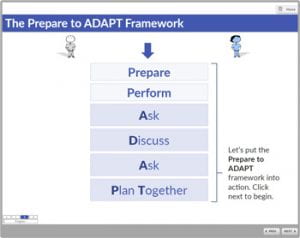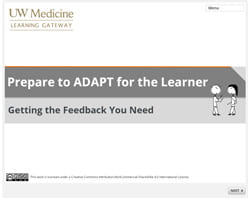Prepare to ADAPT
 Here at UW we care about providing excellent teaching and clinical care. A key component of always improving is giving and receiving quality, and effective feedback. We use a model developed here at UW Medicine for delivering and asking for feedback called “Prepare to ADAPT.”
Here at UW we care about providing excellent teaching and clinical care. A key component of always improving is giving and receiving quality, and effective feedback. We use a model developed here at UW Medicine for delivering and asking for feedback called “Prepare to ADAPT.”What is “Prepare to ADAPT”?
The Prepare to ADAPT (Ask-Discuss-Ask-Plan Together) feedback framework is an approach to asking for, receiving, and providing feedback in the clinical learning environment.
Why “Prepare to ADAPT”?
The “Prepare to ADAPT” feedback framework is a theory-informed conversational approach to feedback based on the “Ask-Tell-Ask” discourse pattern that providers often follow with patients. The “Prepare to ADAPT” feedback framework adds 1) a “Prepare” step, emphasizing learner reflection on goals, and 2) a “Plan Together” step for the creation of an intentional follow-up plan for improvement.
Based on our pilot study at the University of Washington, we found the model to be efficient and flexible, particularly for formative feedback. We also found that clarity around the process of feedback for both learners and coaches was perceived to reduce “feedback stress” in the clinical learning environment. The model can be utilized in various clinical scenarios and can take as little as five minutes, or can expand based on the situation and needs. Learners who normally struggle with how to ask for feedback—and coaches who struggle to provide meaningful feedback—find it particularly useful.
Practice using the “Prepare to ADAPT” framework in your clinical practice
|
Learner Initiates • Reflect on learning goals. |
Prepare for the observation ⇓ |
Coach Initiates • Reflect on program & learner goals. |
| • Try to be natural | Perform | • Try to be neutral |
|
• Reflect on the observation • ASK for feedback |
Ask ⇔ |
• Reflect on learner’s readiness • ASK for his/her thoughts about the observation |
| • Have a conversation about the observation |
Discuss ⇔ |
• Coach observed, modifiable, specific behaviors related to the task(s) |
| • ASK for clarification |
Ask ⇔ |
• ASK learner to clarify points, as necessary |
| • Plan next steps with your coach |
Plan Together ⇔ |
• Plan next steps with your learner |
Developed at the University of Washington, UW Medicine, by Susan Johnston, EdD; Judith Pauwels, MD; Kristen Patton, MD; Tyra Fainstad, MD; Addie Hearst McClintock, MD
UW GME recommends the use of this framework with residents, fellows, and faculty so that that a common approach and language about feedback is shared throughout the learning environment.
Learn about “Prepare to ADAPT”
Two companion learning modules utilizing “Prepare to ADAPT” feedback framework have been developed: One for learners and one for coaches.
“Prepare to ADAPT” for Learners: Getting the Feedback You Need
This module empowers learners to ask for feedback with “Prepare to ADAPT.” Learners are encouraged to take initiative in doing the following:
-
- Identify their coaches—attendings, peers, or other individuals in their learning environments
- Share the feedback framework with their coaches
- Capture the most salient feedback points for next steps.
Prepare to ADAPT for Coaches: Providing High Quality Feedback
This module identifies learner attributes that create feedback successes as well as challenges. Coaches apply principles to help create a learning environment that encourages the feedback process, while employing the “Prepare to ADAPT” feedback framework to give useful, brief, specific and actionable feedback. This eLearning module takes about ten minutes to complete.
After coaches “Plan Together” with learners, learners can be encouraged to document “Next Steps” or “Take-Aways” from the discussion. Documenting the most salient features of the discussion supports longitudinal learning. Suggestions for learners and coaches include:
How to Use “Prepare to ADAPT”?
Here are a few tips for implementing the Prepare to ADAPT model in practice.
- Sharing the framework with coaches/feedback receivers ahead of time so they know what to expect.
- Figure out a system to track feedback and longitudinal learning best suited for you/the individual learner. Some options include: keeping a “feedback log” of “Plan together / Next Steps,” either as notes on a phone, on a computer, in an actual notebook, or on notecards in your pocket, or using a mobile phone to dictate (or type into a computer) “Next Steps” into a program assessment database system (e.g., MedHub, eValue). Save these suggestions to review at a later time.
- Incorporating the “Next Steps” into an Individual Learning Plan (ILP).
What residents and fellows have to say about “Prepare to ADAPT”
- “Quick and simple, and gave very specific things to do.”
- “Feedback doesn’t have to be a huge cumbersome process. You can do it on the go.”
- “…it’s the best learning module I’ve ever done!!! …I’m so glad I got to do this one!”
- “We don’t get enough feedback… this is a great approach.”
- “I can’t remember getting this kind of feedback before…. This is new. It is like a two-way street with the planning together piece.”
- “The module is easy to use and didn’t take very long.”
More Resources on “Prepare to ADAPT”
The following is a list of additional resources:
- ACGME Resource: For more on the “Prepare to ADAPT” Feedback Framework, see “Clinical Competency Committee Guidelines” under the Milestones Publication Tab (External Link)
- Download the Prepare to ADAPT Model Summary (PDF)
- Feedback Can Be Less Stressful: Medical Trainee Perceptions of Using the Prepare to ADAPT (Ask-Discuss-Ask-Plan Together) Framework (External Link) in Cureus Journal of Medical Science


